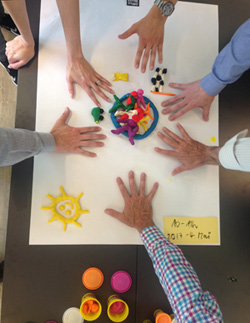Change Management | OD - toward the ability for transformation with merik
Stronger capacity for change
"Notoriously, swimming is synonymous for genuine learning, as progress is only possible through the loosening of frozen structures." [Levin]
Change is constant. Change is cultural. Change can result in fears and feelings of being overwhelmed.
I will be at your side to conceptualise and implement your organisational development and change management.

What is it an organisation needs to be capable of, so that it can be one step ahead of market dynamics at all times?
How can our employees take on joint accountability and continuous learning? How can we get away from negative behaviours?
If we can make use of our employees´ skills in their entirety, then we can create a safe place and are prepared for changes.
Inspiring, enquiring and courageous.
You get an overview of the current situation. I support you in freeing yourself from patterns that hinder progress and in working towards new solutions.
Send me your opinions to the questions above. What are the challenges you face in terms of change management?
Fostering engagement: 3 types of commitment in change and development processes
Change and development processes are complex. Their effectiveness can be guaranteed and accelerated through carefully selected interventions. We focus on 3 types of commitment:
1. Commitment to the organisation/topic
„I am enthused.“
Heartfelt visions are likely to be realised. If the meaning of the job and the enterprise is understood, then this will set free an enormous force for change. But this cannot be pushed from the top down. Enthusiasm is arised from having a genuine interest in something that is useful and creates a good feeling. If this can be achieved with employees, then they will develop a thirst for learning. We need interaction, debate and explorations based on communication and dialogue, so that an open conversation culture can evolve. We strengthen trust, joint and personal accountability, which are incredibly important in order to seize the opportunity linked to complexity, and to avoid running into a dead end as a result of being overwhelmed.
2. Commitment to personal growth
„Lifelong learning.“
This means everyone is committed to continuously develop themselves and to realise their potential as much as possible. In concrete terms this is about setting personal objectives, checking assumptions, correcting pre-conceptions, having personal experiences, finding new ways of alignment and expanding your options for action. Everyone keeps learning within their own circumstances and ends up growing.
3. Commitment to colleagues
„My colleagues are successful.“
This is the litmus test as good relationships significantly strengthen and support any plan for change. Team spirit is created by co-creation. Everyone is committed to the others´ success, you learn about alternative points of view and perspectives, build bridges and tear down walls. From an EGO to the ECO system. We can only learn to realise our entire potential when we are part of meaningful relationships. Then, above all, team learning means listening, as well as understanding others. Once you succeed in creating a safe place free from domineering forces, and the unexpected is welcomed, then new developments will happen almost on their own.
This approach requires selective methods and fitting interventions, which we will customise together.
For inspiration: How do people react to increasing complexity?
Find the answers in this video (Youtube 5min)




